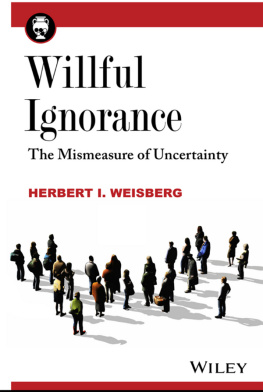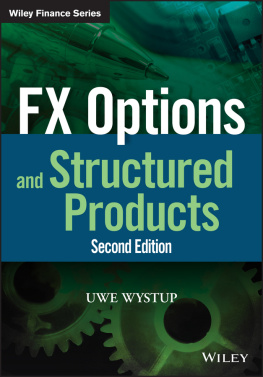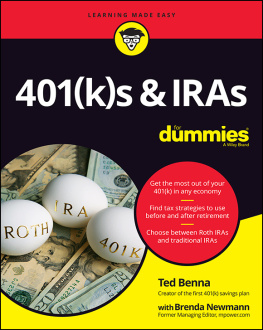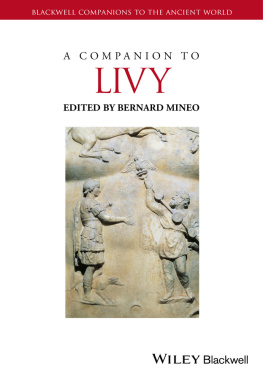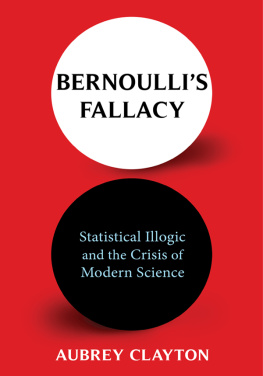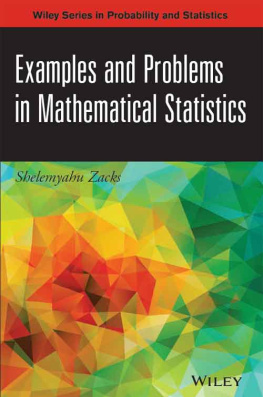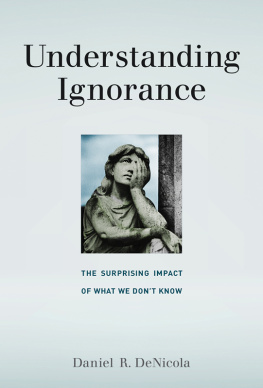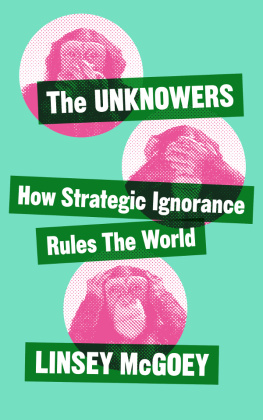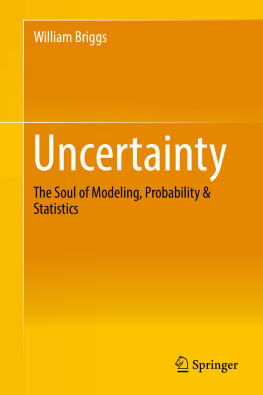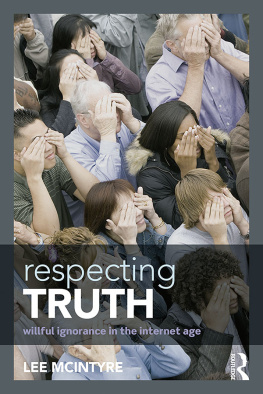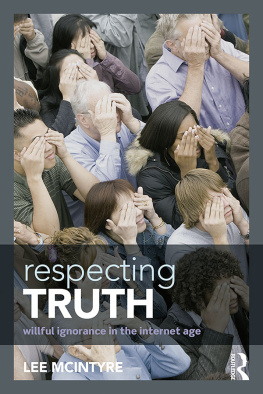
WILLFUL IGNORANCE
The Mismeasure of Uncertainty
HERBERT I. WEISBERG
Correlation Research, Inc.
Needham, MA
Copyright 2014 by John Wiley & Sons, Inc. All rights reserved.
Published by John Wiley & Sons, Inc., Hoboken, New Jersey.
Published simultaneously in Canada.
No part of this publication may be reproduced, stored in a retrieval system, or transmitted in any form or by any means, electronic, mechanical, photocopying, recording, scanning, or otherwise, except as permitted under Section 107 or 108 of the 1976 United States Copyright Act, without either the prior written permission of the Publisher, or authorization through payment of the appropriate per-copy fee to the Copyright Clearance Center, Inc., 222 Rosewood Drive, Danvers, MA 01923, (978) 750-8400, fax (978) 750-4470, or on the web at www.copyright.com. Requests to the Publisher for permission should be addressed to the Permissions Department, John Wiley & Sons, Inc., 111 River Street, Hoboken, NJ 07030, (201) 748-6011, fax (201) 748-6008, or online at http://www.wiley.com/go/permission.
Limit of Liability/Disclaimer of Warranty: While the publisher and author have used their best efforts in preparing this book, they make no representations or warranties with respect to the accuracy or completeness of the contents of this book and specifically disclaim any implied warranties of merchantability or fitness for a particular purpose. No warranty may be created or extended by sales representatives or written sales materials. The advice and strategies contained herein may not be suitable for your situation. You should consult with a professional where appropriate. Neither the publisher nor author shall be liable for any loss of profit or any other commercial damages, including but not limited to special, incidental, consequential, or other damages.
For general information on our other products and services or for technical support, please contact our Customer Care Department within the United States at (800) 762-2974, outside the United States at (317) 572-3993 or fax (317) 572-4002.
Wiley also publishes its books in a variety of electronic formats. Some content that appears in print may not be available in electronic formats. For more information about Wiley products, visit our web site at www.wiley.com.
Library of Congress Cataloging-in-Publication Data is available.
ISBN: 9780470890448
I have known that thing the Greeks knew notuncertainty.Mine is a dizzying country in which the Lottery is a major element of reality.
Jorge Luis Borges
This fundamental requirement for the applicability to individual cases of the concept of classical probability shows clearly the role of subjective ignorance as well as that of objective knowledge in a typical probability statement.
Ronald Aylmer Fisher
To a stranger, the probability that I shall send a letter to the post unstamped may be derived from the statistics of the Post Office; for me those figures would have but the slightest bearing on the question.
John Maynard Keynes
NOTES
. Jorge Luis Borges (1941). La Loteria en Babilonia (The Lottery in Babylon) in Ficciones (1944). Buenos Aires: Editorial Sur; Translated by Anthony Bonner and published as Ficciones (1962). New York: Grove Press.. Ronald A. Fisher (1959b). Statistical Methods and Scientific Inference, 2nd ed. Edinburgh: Oliver and Boyd, p. 33.. Keynes, John Maynard (1921). A Treatise on Probability. London: Macmillan, p. 71.
PREFACE
The History of Science has suffered greatly from the use by teachers of second-hand material, and the consequent obliteration of the circumstances and the intellectual atmosphere in which the great discoveries of the past were made.
R. A. Fisher
Sir Ronald A. Fisher, the founder of modern statistics, was certainly correct to point out how much is lost by abstracting major scientific developments from the context in which they evolved. However, it is clearly impractical for all but a few specialists to delve into original source material, especially when it is technical (or in Latin). In this book, I have attempted to convey some of the circumstances and intellectual atmosphere that have led to our modern idea of probability. I believe this is important for two reasons. First, to really appreciate what probability is all about, we must understand the process by which it has come about. Second, to transcend the limitations our current conception imposes on us, we must demystify probability by recognizing its inadequacy as the sole yardstick of uncertainty.
Willful Ignorance: The Mismeasure of Uncertainty can be regarded as two books in one. On one hand, it is a history of a big idea: how we have come to think about uncertainty. On the other, it is a prescription for change, especially with regard to how we perform research in the biomedical and social sciences. Modern probability and statistics are the outgrowth of a convoluted process that began over three centuries ago. This evolution has sharpened, but also narrowed, how we have come to reason about uncertainty.
Willful ignorance entails simplifying our understanding in order to quantify our uncertainty as mathematical probability. Probability theory will no doubt continue to serve us well, but only when it satisfies Einstein's famous maxim to make everything as simple as possible but not simpler. I believe that in many cases, we now deploy probability in a way that is simpler than it needs to be. The mesh through which probability often filters our knowledge may be too coarse. To reengineer probability for the future, we must account for at least some of the complexity that is now being ignored.
I have tried to tell the story of probability in 12 chapters. Chapter 1 presents the problem that needs to be addressed: the dilemma faced by modern research methodology. Chapter 2 is a whirlwind tour of the book's main themes. After these two introductory chapters, the next five are rich in historical detail, covering the period from 1654 to around 1800 during the time mathematical probability developed. Those readers who are more interested in current issues than history, might wish to skip ahead to read Chapter 12, in which I propose a solution, before circling back to the historical chapters.
Chapter 8 is a mix of history and philosophy, sketching the diversity of interpretations that have been attached to the basic concept of probability. In Chapter 9, with help primarily from Fisher, I attempt to cut through the massive confusion that still exists about probability. Chapter 10 discusses the origins of modern statistical methodology in the twentieth century, and its impact on scientific research. In Chapter 11, I explore how mathematical probability has come to dominate and in certain respects limit our thinking about uncertainty. The final chapter offers a suggestion for adapting statistical methodology to a new world of greatly expanded data and computational resources.
Previous historical writing about probability has focused almost exclusively on the mathematical development of the subject. From this point of view, the story is one of steady progress leading to a mature intellectual achievement. The basic principles of probability and statistics are well established. Remaining advances will be mainly technical, extending applications by building on solid foundations. The fundamental creative work is behind us; the interesting times are over.
There is, however, an all but forgotten flip side of the story. This
Next page
